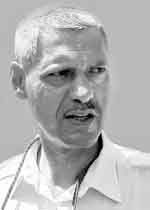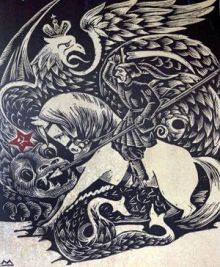The Central Council of Ukraine, created in March 1917, was a stepping stone toward Ukraine’s independence and the establishment of the Ukrainian People’s Republic. Shortly after the new Ukrainian state’s formation, however, a few hundreds cadets, students and members of Free Cossacks had to defend it during a battle near the village of Kruty.
On January 29 Ukrainians commemorated the Heroes of Kruty. A requiem took place at the Kruty station. Though the regional state administration became one of the action’s organizers in the Chernihiv region, enthusiastic Ukrainians without ranks and other regalia became the main initiators of the commemoration of the battle. On January 29 young people from Lutsk and Ivano-Frankivsk held similar actions. Recently the public organization Ukrainian Alternative organized an automobile race from Kyiv to Kruty dedicated to the 93rd anniversary of the battle.
While the Ukrainian youth initiates activities to commemorate the Heroes of Kruty, national channels “forget” about the battle and the state cannot find money to make a movie about those events, though a script has already been approved by corresponding state institutions.
The chronic neglect of history’s lessons, the misunderstanding of the context of important historical events, in particular, the battle of Kruty, create a danger of repeating the tragedies of the past.
Serhii BUTKO, a historian, representative of Ukraine’s National Memory Institute in the Chernihiv region, answered The Day’s question about what should be done to prevent a situation when only those young people who on the Unity Day created a human chain between the Dnipro banks will defend the Ukrainian statehood.
“Rejection or thoughtlessness in attitude to what happened near Kruty happens first of all because of the lack of knowledge about those events. I recently talked to one journalist (!), who actually boasted that she didn’t know anything about Kruty. After my half-an-hour-long story about the battle she reevaluated this event, grew interested in it, and the exploits of the Heroes of Kruty started making sense in her mind. Therefore it is really necessary for all Ukrainians to understand what kind of event it was and in what historical context everything happened. Today it is important for us that those young boys (450 cadets of the Khmelnytsky Military College, the first student unit’s squadron, and about a hundred of members of the Free Cossacks), who on January 29 defended the Ukrainian territory from the aggression of a foreign army, did it consciously. They understood that the future of their state depended on them. Second, we must understand that the battle, despite all the losses, was efficient. The young people managed to beat off the enemy, retreat in an organized manner, dismantle a track, and delay the troops of Muravyov for three days. In this time a handful of Ukrainian troops managed to foil the Bolshevik’s plot in Kyiv and the leaders signed a peace treaty in Brest-Litovsk — after that the Ukrainian People’s Republic, in fact, won the war. Besides, these young boys managed to cause serious losses to the enemy. On the Ukrainian side in the battle near Kruty 140 people died, about 130 were wounded or taken prisoners, after what they survived or were missing, and 30 were executed, while from the Bolshevik’s side 300 were killed, and 1,200 were wounded [these figures have been disputed by other sources – Ed.].
“At the same time, students and cadets defended their country while thousands of trained former tsarist soldiers, possessing lots of weapons, were drinking and telling one another that they were tired of war and wanted land and peace. These adults kept themselves aloof from the struggle for their own sake. In perspective those who struggled near Kruty won and those who dodged faced political repressions, the Holodomor and a totalitarian regime. Therefore the commemoration of the memory of the Heroes of Kruty, as Yevhen Malaniuk said, is a commemoration of the birth of new Ukrainians who understand that this is their state and they are the masters in this country, that whether this country will be like we want it to be depends on each of us.”
How should the Heroes of Kruty be commemorated to make Ukrainians fully understand all those important issues you mentioned?
“I am glad that it is firstly society that initiates the commemoration of the Heroes of Kruty. This means that there are people who know about those events and honor them. The people’s artist of Ukraine Yaroslav Havryliuk together with Prosvita has been preparing a new edition of the book Kruty. January 1918, since the first edition of 3,000 copies was sold out immediately. This book contains the script of a movie about the battle near Kruty. It passed all official procedures but the movie has yet to be made.”
Why?
“This requires money. In recent years there was no money, though there were many promises. As a historian, I suppose information about Kruty should be spread in different ways, including artistic ones. Then the commemoration of the Heroes of Kruty will gain more and more content.”
We have recently observed attempts to close the Museum of the Ukrainian People’s Republic. How can such actions be explained given that Ukraine needs its heroes now more than ever?
“I hope the understanding of the fact that the state can only develop in a stable and dynamic way if there is an efficient policy of national memory will prevail. Ukraine has its heroes. Only they, and historical facts, should not be used to spread xenophobia. Galicians, the Dnipro Ukraine residents, and ethnic Russians who fought for the Ukrainian state participated in the battle near Kruty. This was not a conflict between ethnicities or nationalities but a conflict of one state against another. I adhere to Viacheslav Lypynsky’s concept stating that Ukraine is the state of the Ukrainian people, which unites all Ukrainian citizens regardless of their ethnic origin. Dmytro Dontsov, the father of the concept of integral nationalism, is an ethnic Russian. But there should be political will and wisdom to speak about it.”
Dmytro Dontsov once criticized democrats of the early 20th century for their excessive moderation. If we consider the recollections of one of the participants of the Battle of Kruty Ivan Shary, he writes that precisely the untimely retreat from the battleground was the reason for their defeat. Current Ukrainian democratic forces are based on traditions of statehood of the early 20th century. Where shall we look for the roots of our statehood: in Kyivan Rus’, the period of revival of the Ostroh princes, the Cossack Era, or the Ukrainian People’s Republic? How can one span these historical periods and take the best from them?
“Ukrainian statehood is when the Ukrainian people are the master of their house. This means we should see our roots in Kyivan Rus’, in the state of Bohdan Khmelnytsky, in 1917-21, and in the interwar struggle. Nothing can be discarded.”








